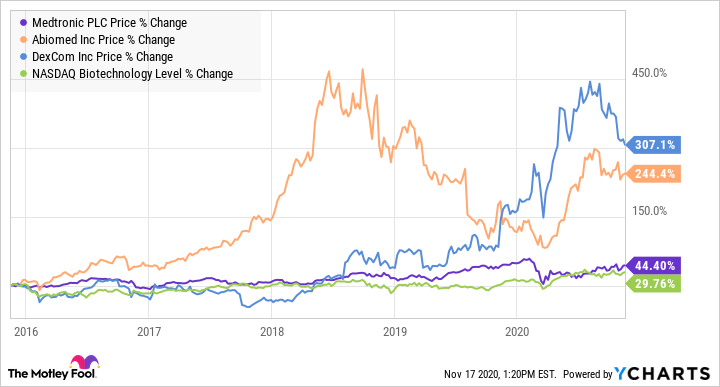Even though the biotech sector's coronavirus vaccine efforts have dominated the 2020 news cycle, those stocks don't always beat the market. When it comes to consistent profitability, long-term growth, large competitive moats, and innovation, medical device companies can provide better returns in the long run. In particular, DexCom (DXCM 2.89%), Medtronic (MDT -1.12%), and Abiomed (ABMD) have beaten the NASDAQ Biotechnology Index handily over the last five years.
And, while they may not have had triple or quadruple-digit gains this year like a few of the coronavirus vaccine stocks out there, they still have plenty of room to grow. Furthermore, there are upcoming catalysts for growth that are worth keeping a close eye on.
DexCom's glucose monitor revenue exceeds expectations
If you had to check your blood glucose level a few times per day, you'd probably grow tired of pricking your finger to draw a drop of blood. Using DexCom's continuous glucose monitors (CGMs) means that patients living with diabetes only need to check their smartphone application to check their blood glucose levels. Once people start using the system, they have to purchase replacement sensors for every 10-day period, meaning that DexCom's revenue has a significant recurring component. Strong sales of the latest monitor, the G6, have driven yearly total revenue to grow at least 34% year over year since the start of 2018.
In fact, growth has been so strong that it exceeded management's revenue and profitability estimates. As of its most recent earnings report, the company expects to earn around $50 million more than it predicted for this year. Plus, its healthy gross margin and operating margin will be slightly larger too. DexCom isn't content to rest on its laurels, however -- the next CGM device is already in development. Given that only around 20% of the people with type 2 diabetes in the U.S. have a continuous monitoring device, it's clear that revenue will grow for years to come as DexCom expands its reach into its massive target market.
Innovation at a breakneck pace is normal for Medtronic
Competing in many different medical markets is second nature for Medtronic, so it's no surprise that it is now planning to manufacture medical robotics and digital surgery systems. With its recently announced Touch Surgery platform, clinicians can transform video taken during surgeries into interactive computer generated images. Then, these images can be used to train new surgeons, analyze results, and provide other critical information.
This new product line will dovetail perfectly with Medtronic's minimally invasive therapies (MIT) segment, which earned the company $1.8 billion (of $6.5 billion total sales) in the most recent quarter alone. It'll also drive fresh revenue growth in a market that is becoming increasingly crowded. In the future, the MIT segment may even offer products in every element of the surgery value chain. Until then, expect it to retain the top spot in the markets for defibrillators, surgical staplers, and pacemakers.

Image source: Getty Images
Abiomed is becoming a market leader in cardiac support
Abiomed is the smallest of the companies I'll discuss today, but it still massively outperformed the biotech sector over the last five years. The company's main product is its line of Impella heart pumps, which keep a patient's blood circulating during heart surgery. These pumps were the largest contributor to its $841 million in revenue during its 2020 fiscal year. Impella sales are expanding rapidly, with a sequential increase of 29% compared to last quarter, contributing to year-over-year quarterly earnings growth of 376%.
Abiomed has continually reinvested in the Impella since it became the first U.S. Food and Drug Administration (FDA)-approved cardiac pump for high-risk heart surgeries in 2015. Now, the pumps are used in several new surgical niches in addition to what they were initially approved for.
While it expects to eventually face competition from larger players like Abbott Laboratories (ABT -0.65%), Abiomed is the dominant actor in the market for the time being. When the real competition starts, Abiomed will still have a major advantage that others won't: specialization. Few companies will be willing to spend upwards of $98 million per year in research and development (R&D) efforts on cardiac pumps alone.






